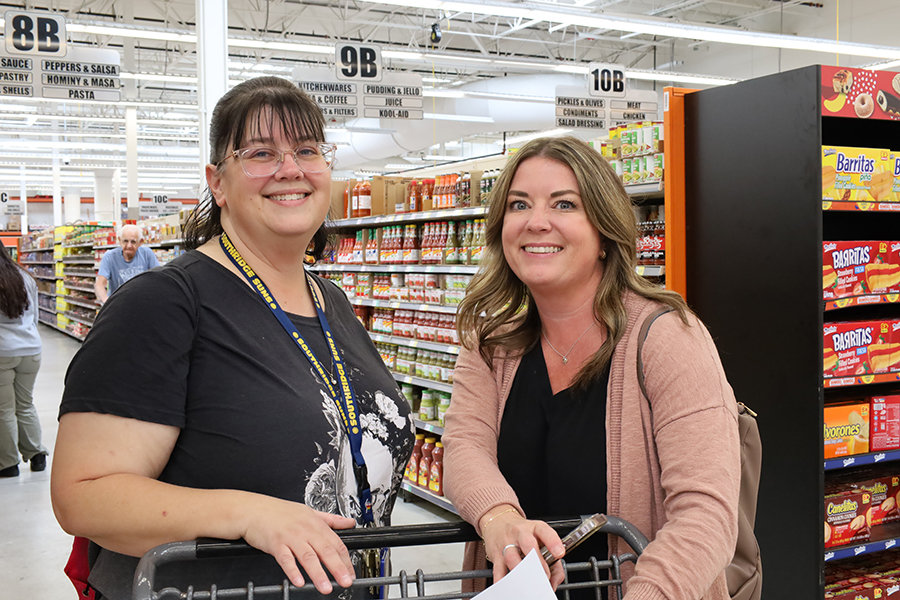
Home » Kennewick newcomers learn how to ‘do America’
Essential life skills
Kennewick newcomers learn how to ‘do America’

Sheila Morales, who came to the U.S. from Cuba, checks prices at WinCo during a recent Newcomers class exercise. She is a rising 10th-grader from Southridge High School in Kennewick.
Photo by Rachel VisickJuly 15, 2024
Just a couple of weeks after the last day of school, 13 students assembled at the WinCo Foods in Kennewick to continue their learning. Though they spoke different languages, all had one thing in common: they had lived in the United States for less than two years.
The Kennewick School District launched its first Newcomers class this summer, an Independent Living Career and Technical Education, or CTE, course taught at the Tri-Tech Skills Center.
The intensive, 12-day summer class was free and aimed to teach essential skills to high school students who were new to the country. Or, as co-teacher Kristina Hocking put it, teach them “how to ‘do America.’”
Hocking, a multilingual learner and English teacher at Southridge High School, co-taught the course along with Stephanie Zerba, a CTE teacher at Southridge.
She had seen one student throwing away gift cards because he thought they were advertisements, and others struggling with writing addresses.
Students in the course came from different countries, including Mexico, Cuba, Guatemala, Syria and Congo. They all had different educational backgrounds and different levels of comfort with English.
But all gave up a part of their summer to learn more about living in the U.S.
Life lessons
The course covered a wide variety of practical topics, from insurance to appropriate clothing, from job applications to reading medical labels.
With a short time frame, the instructors had to choose the most important topics to cover, about one each day. Teaching one 7:45 a.m. to 3:45 p.m. school day is about equivalent to a week’s worth of a class, Hocking said.
The group also went out on several field trips, including the WinCo trip. Students had previously talked about budgeting and came up with a menu for a week with that included three balanced meals a day and two snacks, Hocking said.
They broke the menu down into ingredients they would need to buy and roamed the aisles of the grocery store, marking the prices they found. The total could be multiplied by four to get a rough estimate for a monthly food budget.
Several of the students were surprised by “the cost of the things,” as Sheila Morales, a rising 10th-grader from Southridge High School, said. She came to the U.S. from Cuba and found that everything was pricier than expected.
On the other hand, Diana Amuli, who is from Congo, thought that “all the food (was) less expensive.” A $27.98 cake, however, surprised the 10th-grader from Kennewick High School.
She described the move to the U.S. as “a long journey. We took five planes,” Diana said. She arrived with her family of eight about nine months ago.
Diana has found many of the class’s topics important: learning “how to buy a car, how to be prepared, how to plan for a budget” and communication skills were all valuable to her.
The students had spent time “shopping” for cars and apartments online, and the instructors walked them through the process of getting a driver’s license.
Maria Torres, a Southridge 10th-grader from Mexico, found it important to learn “to speak formally.” The teachers had discussed the differences between language used with friends and in a formal setting.
Maria also found the biggest differences in the U.S. to be “the food and the clothes.”
At the end of the WinCo field trip, Hocking planned to buy ice cream and toppings. Later in the week, she would highlight the differences between going out for a treat or making your own by taking the students to Summer’s HUB of Kennewick to buy ice cream.

Kristina Hocking, left, and Stephanie Zerba taught Kennewick School District's new Newcomers class, a free course designed to teach essential skills to high school students who are new to the country.
| Photo by Rachel VisickLanguage barriers
To gather a group of students new to the U.S., the school district relied on its migrant and bilingual specialists and counselors, Hocking said. They helped connect students with the course.
The class was originally meant to be a little larger, but the course’s attendance policies made it difficult for students who had appointments or who needed to translate for their families to stay in the class.
One student received repeated calls from her aunt during class time, asking for translation assistance.
Hocking said that these high schoolers’ families often depend on them for translations. Learning English is vital to navigating life in the U.S.
Hocking said that some of the students were surprised when she told them their “homework” was to watch TV – in English.
She and Zerba have tried to help the students by including Spanish subtitles on videos or making use of Google Translate to help teach a student who speaks only Arabic.
The students also have supported each other, like Maria, who has helped translate for her peers during the class.
Hocking said that no matter where the students had come from, they all had the “common experience of being new here.” She noted their empathy and patience for each other, as well as their gratitude and excitement to learn.
Takeaways
At the end of the class, students received a certificate of completion and 1/2 of a Career and Technical Education credit or an elective credit.
Hocking said that depending on how old students are when they arrive in the country, and how much education they have had, they might age out of the system before they can get enough credits to finish high school.
In those cases, she said, it’s important to offer as many opportunities as possible to get credit. That could include a summer class like this one, or it could mean testing in their native language to get credit for that literacy.
The students also came away from the class with the new skills they had learned. Sheila said she had wanted to join the class because “it’s so important for my life.”
Latest News Diversity Education & Training
KEYWORDS July 2024
Related Articles
Related Products





